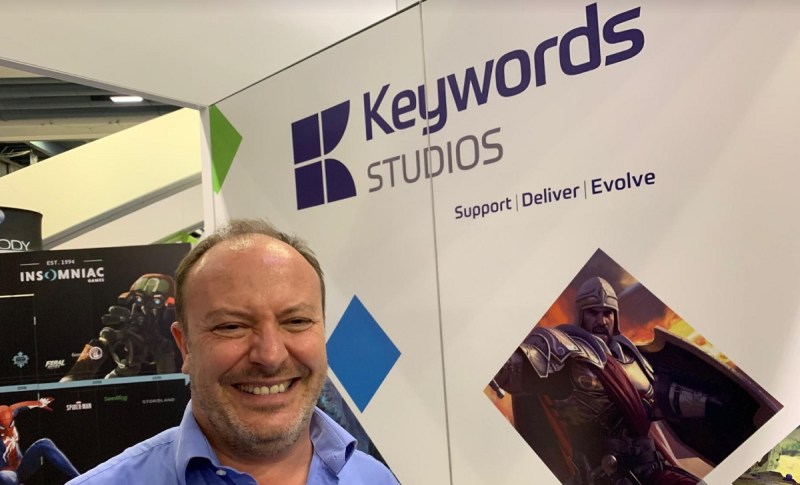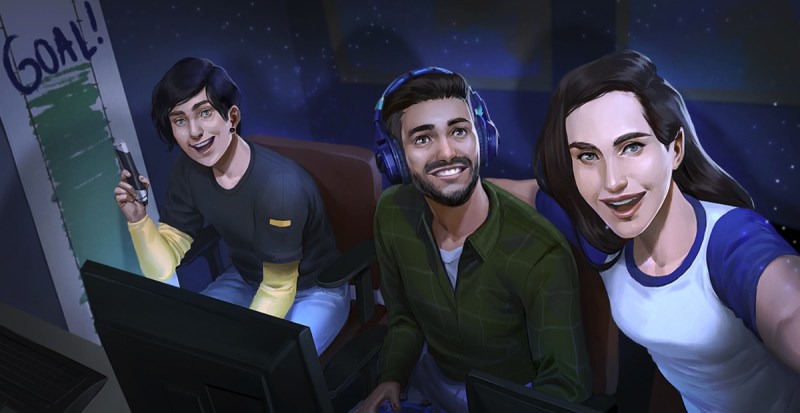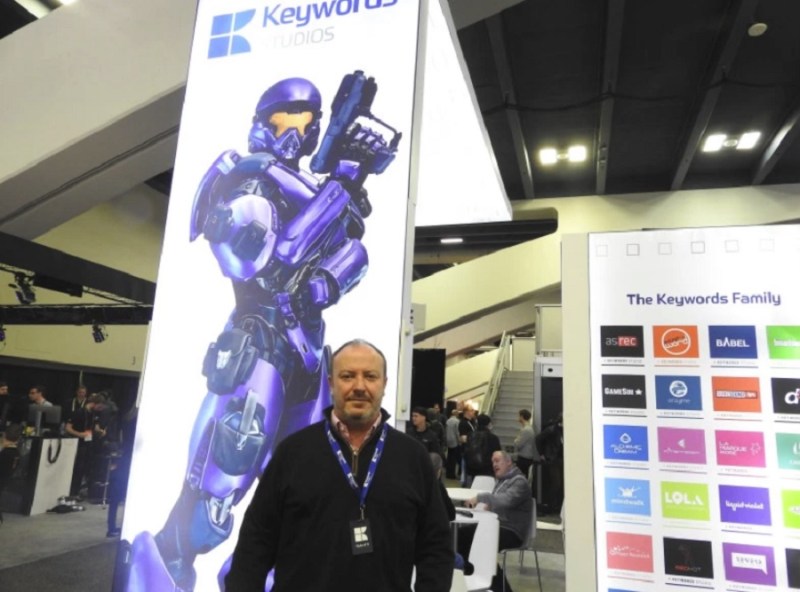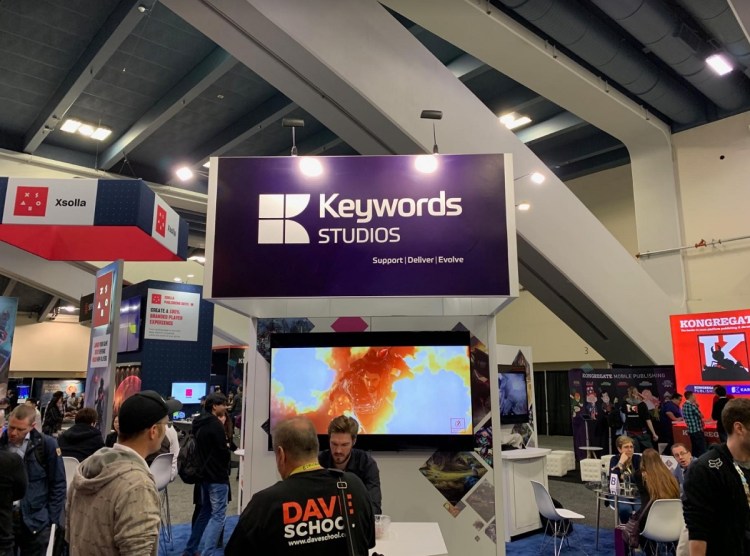We’ve heard about a lot of job losses in the video game industry, with Electronic Arts and Activision Blizzard laying off more than 1,150 people alone. Developers like Telltale … have also gone under, taking with them lots of developer jobs.
But one company has kept growing. Keywords has grown to more than 6,000 people, adding more than 700 game development jobs last year alone. It has grown through 10 acquisitions in the past year, adding more studios with the necessary skills for Keywords’ clients.
Keywords has become one of the biggest game development outsourcing companies in the world. It exists to service the game creators who have dreams of games that are bigger than their staffs. I spoke with Andrew Day, CEO of Keywords, about the business of games in the midst of one of the industry’s biggest shows, the Game Developers Conference in San Francisco.
Here’s an edited transcript of our interview.
June 5th: The AI Audit in NYC
Join us next week in NYC to engage with top executive leaders, delving into strategies for auditing AI models to ensure fairness, optimal performance, and ethical compliance across diverse organizations. Secure your attendance for this exclusive invite-only event.

Above: Andrew Day is CEO of Keywords.
GamesBeat: Are you guys still at about 5,000 people?
Andrew Day: We finished the year with 6,000 on the payroll, but we had an average of about 5,300 last year.
GamesBeat: How many deals did you conclude?
Day: I think eight or nine last year.
GamesBeat: What are you bringing on board? More talent in more places?
Day: What we’ve done, particularly last year, if you look at the acquisitions, we were filling in some of the gaps in our services platform. As you know, we’re building this global services platform for our video game developer and publisher clients. Within that platform, we hope to be able to provide services at all stages of the life cycle of a video game.
For instance, we bought into music services for the first time. We now have a group that manages licensed music. It can have music composed specifically for games. It can do the whole audio branding, helping clients to think about the value of the music within their brand and how important that is to have for the life of the brand and how it is to evolve that over time. We also have a little record label as well, where we license back music that our clients have commissioned. There’s a big fan base for game music, and we can publish that music on behalf of our clients.
We made a few technology investments. We acquired a business called Yokozuna Data, which has a very sophisticated predictive analytics platform, to help increase, effectively, the lifetime value of gamers, while at the same time giving gamers a smoother experience within the game.

Above: Keywords has offices in the U.S. as well for external development.
GamesBeat: Where did you fall on revenue last year?
Day: We already reported, so revenues were 251 million euros. Our profits were 38-ish million euros.
GamesBeat: Does that compare to some other peers that you think are similar in some way?
Day: I don’t think so. I don’t think there is a peer that would be easy for us to compare ourselves to in the first place. I know that we’re the biggest in this space. Others that will do some of what we do, you have companies like Sumo Digital in the U.K. There are a couple of Japanese public companies that do primarily QA services. But for the wide range of services we’ve got, there’s no comparable company.
GamesBeat: Do you feel like you’ve been very flexibly used by the industry?
Day: People use us for a number of reasons. Some people use us because — they almost use us for overflow management. Some people use us as their primary production platform for one or more services. Between there, there’s a range of engagements we have with our clients. Some will use one or two services in a very strategic manner, and then they’ll have a more ad hoc engagement with some of the other services.
We’re finding that it’s been fairly frictionless to introduce clients that are strong, loyal clients of one or two services — it’s been easy to introduce them to other services. What we call cross-selling has been very successful for us. It’s also been very valuable for our clients. It’s a very low-friction way they can access the best of breed services while really having an understanding of how Keywords behaves. If there’s ever an issue, they know how we behave. They know how we respond. They know we put the projects first.
GamesBeat: It’s been a tumultuous industry in the last year. Does that affect you very much?
Day: It’s an industry with lots of ups and downs. It’s very fast-moving. But I think that’s one of the things I like about the Keywords model. We’re not directly exposed to any one of these particular moving parts. We’re the picks and shovels to the industry. We don’t have to bet the farm on whether VR is going to be successful, or whether streaming is going to be the future direction of games. What we need to do is embrace the changes in unison with our clients. As our clients move in this or that direction, we’re brought in with them. We follow the content, rather than the platform or whatever.
We do a lot of work in VR. We do a fair bit in AR. If you look back three years ago, the buzz was all about VR and so on, and it never quite got there. I’m very glad we weren’t having to make a choice as to whether we wanted to invest heavily in that direction or not.
GamesBeat: I thought of you when I learned more about how Cuphead came to market. It was a small team of three people for a long time, and then they caught the attention of Microsoft with the style of the game. Then they started building it up, and in the last four months they tripled the size of the team. They realized they weren’t going to get it done any other way. I don’t know how often you see something like that.
Day: It’s increasingly—I was going to say it’s a well-trodden model, but it’s being chosen now by teams. We have a few clients ourselves where the teams have come out of large, established game companies. They’re high talent teams. They get funding, which is important. Then they make a deliberate decision to keep the core team very tight. They use the services platform we have to provide everything else.
They can achieve global scale just by plugging into the Keywords infrastructure. They can have, hopefully, the best art, the best QA, the best localization, great backend tools, all that sort of thing, without having to do it all themselves. It’s a very efficient way of developing quite large games, without having to staff up internally. The traditional model of doing everything yourself is increasingly looking a bit odd.

Above: Keywords Studios CEO Andrew Day in 2017.
GamesBeat: I was also thinking of Rockstar, with eight years on Red Dead Redemption 2.
Day: They still have the approach of doing pretty much everything themselves.
GamesBeat: But they had 3,000 names in the credits.
Day: Exactly. A lot of them are voice actors and so on. But they did use services from us as well.
GamesBeat: When it’s something that big, what is your pitch that gets you involved?
Day: With all of those things, most people need some help at some stage. Some of it is specialist services that they don’t feel they can or need to build themselves. It might be localization. That’s quite specific. It might be QA. The big guys will have a QA team, but at some point they might need a particular scale, which is quite hard to achieve in a short period of time. They don’t want to necessarily hire a bunch of guys only to fire them in a month or two.
Art is another big one. The amount of art assets that go into a game these days, one of those big games — the level of definition, the resolution of the art assets is such that it takes more manpower. The tools are getting better and better as well, but basically it takes more manpower to produce those assets. We have 1,200 artists on staff.
GamesBeat: Do you think there’s more of a future where you see that kind of game, or the opposite direction?
Day: I honestly don’t know. Personally I think it’s going to be a mix. There’s a market for everything. The games market is growing. There are more and more gamers out there. The challenge for game companies is going to be segmenting their markets. It doesn’t make sense for everybody to go off chasing first-person shooters or MOBAs or battle royale games and so on.
GamesBeat: If you get a certain visibility into the industry that a lot of other companies don’t, what would you say you’re seeing?
Day: It’s interesting. We do get a lot of visibility. I think we could be better at interpreting things. Our guys, on a daily basis, are seeing trends and seeing customers asking for certain things. Patterns are repeated. We’re not always good at surfacing that to a senior level. But for instance, we were the first company I know of that saw the Fortnite effect, which then other public companies started to talk about. They started explaining how Fortnite had affected our own businesses. We saw that quite early.
GamesBeat: Do you mean the impact of Fortnite on other games?
Day: Right. Obviously we were working on those other games, so we saw our revenues on those other games declining. Other games in live services, that was mostly where it was. For the big guys, it might have impacted the number of units they sold, at the scale of that game. But it wasn’t the same impact as, say, you have a live game and you suddenly lose 10 or 20 percent of your players, and your game was only marginally profitable to begin with. That’s enough to sink a game.
We saw that happen. We saw the root of it in Fortnite, because we provide a lot of services to that game. We also saw the negative impact it was having. I’m not saying it’s a bad thing. There are winners and losers. They just out-competed other games.
GamesBeat: The other thing that people wonder about is whether single-player is dead. I don’t know if you’ve noticed any of that. I talked to Amy Hennig about her experience with Visceral and shutting down their story-based Star Wars game. She was saying that it’s very risky to do these games now, because only certain companies really believe in them, like Sony. The way that has to move, she said, is toward smaller teams tapping different kinds of resources.
Day: I’ve seen that sort of stuff. People are saying there has to be another way. I think the other way is, you keep a tighter core team and you leverage resources like Keywords. Whether it’s Keywords development resources or art resources or whatever. The game gets built, but in a way where you’re not damaging the people all the time.
What happens on these big games, you assemble everyone in one location and you have a very intense period of time when you’re building the game and putting it all together. That might last two or three years. At the end of it you release, and then you start laying off the team again. That model just doesn’t make sense anymore.
What I like about what we do is we can have fantastic talent on our side, and our job, as leadership guides, is to make sure we can bring the best games to our talent. That’s what they’re there for. They love games. They love having their names associated with fantastic IP. As long as we can keep bringing great games to them, they can stay in one place. They don’t get fired every couple of years. They get the challenge and the thrill of having helped these great IP make it out into the market.

Above: Keywords has become one of the biggest game outsourcing companies.
GamesBeat: Is there a collection of a lot of people who need gigs, or is it somewhat more structured than that? Do you have actual studios?
Day: Yeah, we have studios. We have 54 studios around the world in 23 locations. If you take something like Montreal, we have, I think, five service disciplines based out of a single city. They’re in two locations within the city, because we got too big for one location. That’s a pretty big operation. In Tokyo I think we have four or five disciplines operating out of our Tokyo studio. That’s just over 300 people.
The physical location is part of it, but also, studios for us can mean the brand, or it can mean the location. Of our 6,000 people on our payroll, they’re all located in these studios. We then have another 1,500 people that are part of our extended team. Those are mostly freelance translators that we use in our localization business. The roots of Keywords are quite extended.
But no, it makes sense. You don’t want — I’ve seen it too often, where a franchise holder has decided they no longer want to support the franchise. They close it down, and they just mothball the studio. All that great talent is thrown to the winds. With the Keywords model, the talent stays put. If we finish delivering a game, or if a client cans a game, it’s our job then to bring the next game in to the team. It’s not one team, one game.
GamesBeat: Do you think unionization is going to be a big part of the future? There are more people interested in it according to this year’s GDC survey.
Day: Honestly, I don’t know. Personally, from other industries, my experience has been that unionization happens when people are unhappy and feel as if they’re being somehow mistreated. It has to bring something positive for it to make sense.
If I look at our own organization, we resist crunch. We’re not a game developer per se. We work hard, but we structure ourselves so we don’t have to push our staff to ridiculous working hours. We’re a very attractive place to work for people that love video games. We try to bring the best possible games to them. I don’t know if unionization would help any of that.
GamesBeat: As far as the type of skills you see, are mobile game developers in demand?
Day: Oh, yes. We do mobile game development and obviously provide services to mobile games, alongside console and PC and these new streaming platforms and so on. As to whether mobile is somehow less in demand, which I think is what’s behind your question, than in the past–I don’t know. We’ve been through some very hot times with mobile, where everyone thought it was the thing, to go and make a mobile game. People have realized that it’s actually very hard to make a successful mobile game. There are those companies that seem to have a good handle on what it takes to make a good mobile game, the likes of Supercell and so on.
GamesBeat: Have you thought about doing something like a live operations team, or a mobile marketing team?
Day: Live ops is something we do currently. I think we’re supporting three or four games, at least, in live ops, as far as developing features and expanding the worlds, populating them with all the art assets and so on. We do a lot of live services in our player support business. That’s all part of live support ops. What we haven’t done yet is doing everything, soup to nuts, for live ops. We have quite a lot of demand for that kind of live ops. It’s something we would look to try to provide, always in response to demand from our clients.
GamesBeat: If you have more expansion plans, are you looking to acquire certain kinds of companies out there?
Day: This year our focus is to acquire more game development, work for hire types of studios. We have six of them under our umbrella so far. We can’t hire enough people. We’re looking to build out our marketing services business. We acquired three trailer businesses, marketing services and trailer production businesses. We like that space a lot. We’ll be acquiring more. We’ll continue to invest in our other service lines — our audio business, our QA business. You haven’t seen us make a localization acquisition for a while. There’s a reason for that. We feel we already have a lot of scale in that business. It’s not the most important driver for us.
We have our Keywords Ventures business as well, where we’re prepared and looking to invest in interesting new businesses, mostly with technology that we can bring to the game industry. We’re just starting now, and it looks very interesting. We invested in a company that has an automated test solution for GDPR compliance. You can take any app — including games, obviously — run it against this platform, and it will tell you where it’s likely to be falling short of the regulations.
We’re doing a bit more of that, a bit more on the technology side. We bought a company called GetSocial that has a full social layer for mobile games, a platform. You take a mobile game and plumb it into this social platform. All the social features — the interactions, the invitations to friends, the customer acquisition, the rewarding mechanisms, the push notifications — all of that is part of the platform.
GamesBeat: Have you done any work around blockchain?
Day: No. It’s interesting. Like a lot of people, when blockchain was — you couldn’t have any conversation without talking about blockchain. We imagined all the possible uses for blockchain and what we could do. The truth of the matter is we haven’t done anything. But we’ll keep an eye on it and see where it’s headed.


